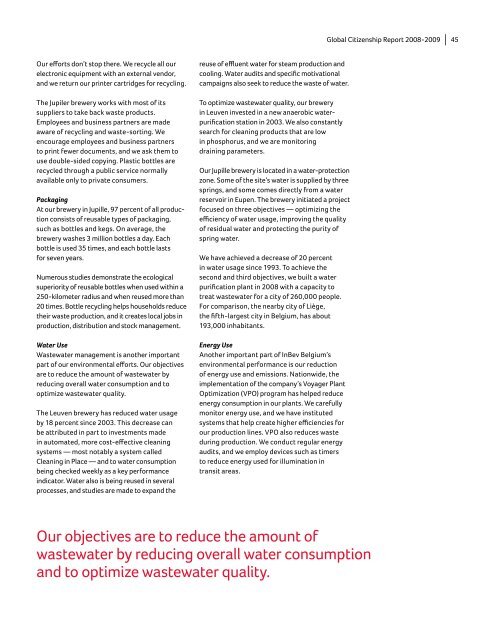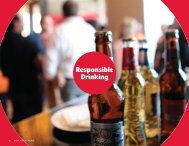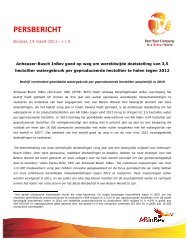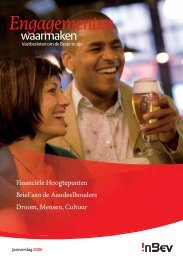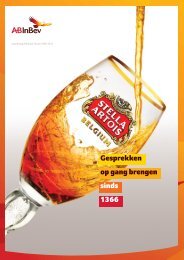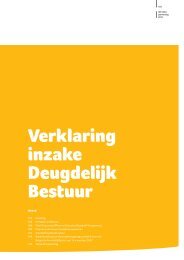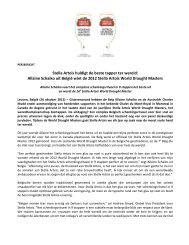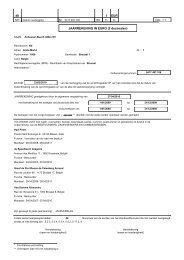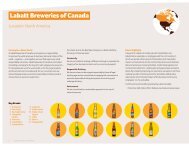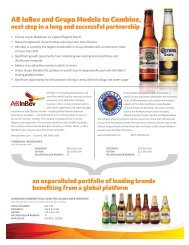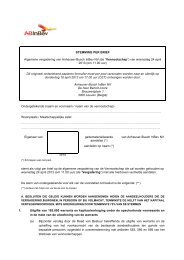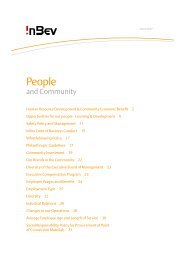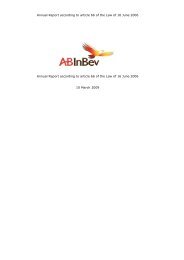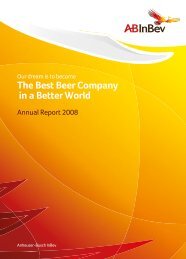Beer & A Better World - Anheuser-Busch InBev
Beer & A Better World - Anheuser-Busch InBev
Beer & A Better World - Anheuser-Busch InBev
Create successful ePaper yourself
Turn your PDF publications into a flip-book with our unique Google optimized e-Paper software.
Our efforts don’t stop there. We recycle all our<br />
electronic equipment with an external vendor,<br />
and we return our printer cartridges for recycling.<br />
The Jupiler brewery works with most of its<br />
suppliers to take back waste products.<br />
Employees and business partners are made<br />
aware of recycling and waste-sorting. We<br />
encourage employees and business partners<br />
to print fewer documents, and we ask them to<br />
use double-sided copying. Plastic bottles are<br />
recycled through a public service normally<br />
available only to private consumers.<br />
Packaging<br />
At our brewery in Jupille, 97 percent of all production<br />
consists of reusable types of packaging,<br />
such as bottles and kegs. On average, the<br />
brewery washes 3 million bottles a day. Each<br />
bottle is used 35 times, and each bottle lasts<br />
for seven years.<br />
Numerous studies demonstrate the ecological<br />
superiority of reusable bottles when used within a<br />
250-kilometer radius and when reused more than<br />
20 times. Bottle recycling helps households reduce<br />
their waste production, and it creates local jobs in<br />
production, distribution and stock management.<br />
Water Use<br />
Wastewater management is another important<br />
part of our environmental efforts. Our objectives<br />
are to reduce the amount of wastewater by<br />
reducing overall water consumption and to<br />
optimize wastewater quality.<br />
The Leuven brewery has reduced water usage<br />
by 18 percent since 2003. This decrease can<br />
be attributed in part to investments made<br />
in automated, more cost-effective cleaning<br />
systems — most notably a system called<br />
Cleaning in Place — and to water consumption<br />
being checked weekly as a key performance<br />
indicator. Water also is being reused in several<br />
processes, and studies are made to expand the<br />
reuse of effluent water for steam production and<br />
cooling. Water audits and specific motivational<br />
campaigns also seek to reduce the waste of water.<br />
To optimize wastewater quality, our brewery<br />
in Leuven invested in a new anaerobic waterpurification<br />
station in 2003. We also constantly<br />
search for cleaning products that are low<br />
in phosphorus, and we are monitoring<br />
draining parameters.<br />
Our Jupille brewery is located in a water-protection<br />
zone. Some of the site’s water is supplied by three<br />
springs, and some comes directly from a water<br />
reservoir in Eupen. The brewery initiated a project<br />
focused on three objectives — optimizing the<br />
efficiency of water usage, improving the quality<br />
of residual water and protecting the purity of<br />
spring water.<br />
We have achieved a decrease of 20 percent<br />
in water usage since 1993. To achieve the<br />
second and third objectives, we built a water<br />
purification plant in 2008 with a capacity to<br />
treat wastewater for a city of 260,000 people.<br />
For comparison, the nearby city of Liège,<br />
the fifth-largest city in Belgium, has about<br />
193,000 inhabitants.<br />
Energy Use<br />
Another important part of <strong>InBev</strong> Belgium’s<br />
environmental performance is our reduction<br />
of energy use and emissions. Nationwide, the<br />
implementation of the company’s Voyager Plant<br />
Optimization (VPO) program has helped reduce<br />
energy consumption in our plants. We carefully<br />
monitor energy use, and we have instituted<br />
systems that help create higher efficiencies for<br />
our production lines. VPO also reduces waste<br />
during production. We conduct regular energy<br />
audits, and we employ devices such as timers<br />
to reduce energy used for illumination in<br />
transit areas.<br />
Our objectives are to reduce the amount of<br />
wastewater by reducing overall water consumption<br />
and to optimize wastewater quality.<br />
Global Citizenship Report 2008-2009 | 45


